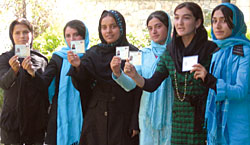 |
On August 4 about 1,500 women collected in the Loya Jirga tent in Kabul. They wore green caps, a green, black and red scarf (the colours of the Afghan flag) in various styles, chatted with each other and listened to the speakers.
They came into Kabul from all over Afghanistan for the launch of the 'Five Million Women Campaign' initiated by the Afghan Women's Network (AWN). The next day they went back to their provinces to organise similar gatherings before Afghanistan's national and provincial elections on 20 August. The goal is to get registered women to come out and vote. Despite Taliban threats, many of Afghanistan's 17 million registered voters of the country's population of 30 million are expected to vote next week.
Nepal and Afghanistan have many things in common. Their populations are about the same size, both are ethnically diverse and both are trying to emerge from conflict. Afghanistan has been more of a battleground for proxy wars, and there has been non-stop conflict since 1978. In 2001, the Taliban were ousted and a provisional government was set up.
The first elections in 45 years took place in 2004 and Hamid Karzai, a Pashtun backed by the Americans, won half the votes and became president. This year, Karzai is running for president against 40 other candidates. There are only two other serious contenders: Ashraf Ghani and Abdullah Abdullah, both of whom served in the Karzai government. Two women are also running: Shahla Ata, a Pashtun MP from Kabul and Frozan Fana, a Tajik and widow of a minister killed in 2002. People here vote along tribal, linguistic or regional lines. In a country so new to democracy and policy making, issues take a back seat. The campaigning is done through hoardings, posters and stickers, there are tv debates but no public canvassing, no jeeps with supporters shouting slogans and garlanding candidates as is common in South Asia. Women campaign door to door, often in burqas, due to threats. Some have had their homes bombed and their husbands have threatened to leave with the children.
There are issues: many feel that there is insufficient progress in building schools, hospitals and creating jobs, and that billions in aid have been misused. Corruption is rampant, inflation is high. The presidential system of governance chosen for Afghanistan in the 2004 constitution suggested the creation of a modern state. A major challenge is the status of women. Despite this, one-fourth of the parliamentarians and Provincial Council members are women, as mandated by the constitution.
The election exercise is an amazing feat of logistics, managed by an Independent Election Commission with the assistance of the United Nations Assistance Mission in Afghanistan (UNAMA) and the UN's election support project UNDP/Elect. About 160,000 polling staff have been recruited, thousands of women and men have been trained to staff the polling stations, learning how to frisk, assist voters and ensure the elections are fair and free. Bringing peace and stability and reconstructing Afghanistan has a direct bearing on the security of Pakistan, India and the rest of the region, and next week's elections will be watched keenly.
Chandra
Twenty-eight-year old Chandra from Kathmandu works as a waiter at one of Kabul's Lebanese restaurants. The restaurant has armed guards, some of them also Nepali, and a delightful garden with fruit trees. "I don't care much about elections or politics," says Chandra, who earns three times his salary in Nepal. The discussion among the waiters and management is always about security, especially in the runup to elections. People are tired of the bombs and rocket attacks and desperately want peace and stability. Chandra takes the security risks in his stride, and had got used to it during the war years in Nepal. But such was his economic desperation that he risked coming here because of the higher pay. There are an estimated 5,000 Nepalis in Afghanistan working for the United Nations, as Gurkhas in the British Army, private security guards, cooks and waiters. Four Nepalis were among 16 killed in a helicopter crash in Kandahar last month, and also Nepali workers have been abducted by the Taliban.


